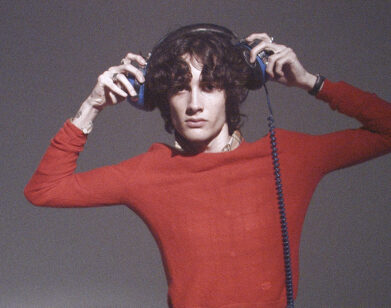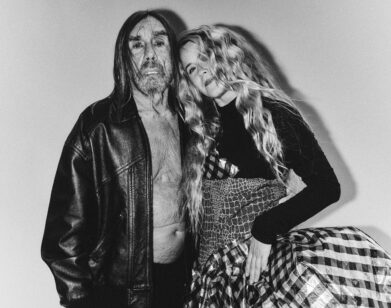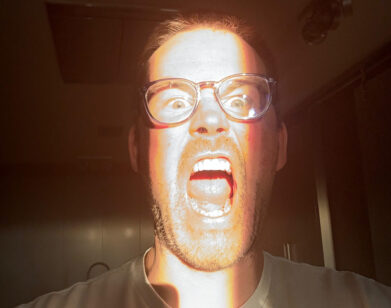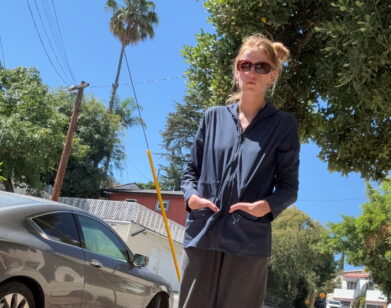Darkening Clouds: Dylan Baldi Reinvents Cloud Nothings
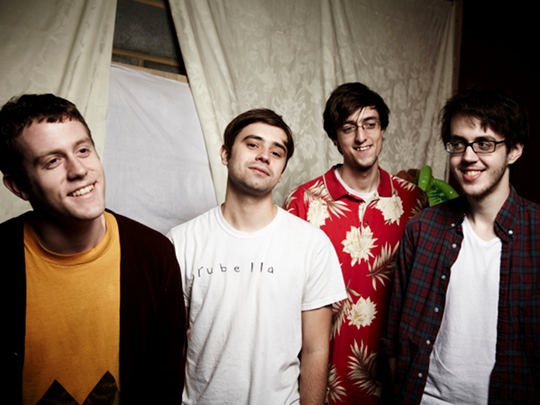
ABOVE: DYLAN BALDI (FAR RIGHT) AND HIS CLOUD NOTHINGS BANDMATES
Cloud Nothings: if you know your indie rock, you know them as a jangly, hook-laden outfit from Cleveland led by singer-songwriter Dylan Baldi, who emerged in 2010 with a knack for affable, even bouncy, two-and-a-half minute singalong tunes that cast Cloud Nothings as a lo-fi, less bratty, Gen Y answer to Blink-182. Well, you can pretty much toss all that out the window.
As the title Attack on Memory suggests, on his third album Baldi is reinventing his band. Cloud Nothings circa 2012 is a much heavier, darker ride, openly inspired by the Midwest post-hardcore of bands like Bitch Magnet and in particular those essential Portland art-punks The Wipers. Opener “No Future No Past” is bleak neo-grunge, Baldi’s nihilistic vocals giving way to a screamo finish the likes of which we haven’t heard Cloud Nothings even approach before, while the pummelling, nearly nine-minute “Wasted Days” features a raucous, layered four-minute space-guitar jam and another angst-filled coda.
It’s excellent throughout, even on (somewhat) poppier fare like “Stay Useless” and “Fall In,” but it is as bold and dramatic a shift in sound as any young band in recent history has made between one album and the next. The record was recorded in Chicago by a man who knows something about post-hardcore, punk curmudgeon Steve Albini. But before you start assuming too much cause-and-effect there, read what Baldi has to say about the man’s non-involvement below. Attack on Memory—that it is, and as we found out when we caught up with Cloud Nothings’ Dylan Baldi on the phone from Cleveland, he relishes the change.
JOHN NORRIS: So Dylan, I actually it’s been kind of under-reported so far just how dramatically different a record this is from what people have come to associate with Cloud Nothings. I don’t know if jarring is the word, but it’s definitely a huge step in a heavier direction. Do you agree?
DYLAN BALDI: Yeah, I definitely would agree with that. But it doesn’t necessarily feel like it to me. You know because I started writing it a while ago, and I was writing in between the last album and this album.
NORRIS: So it feels like more of a natural transition. When were most of these written? Since the last album came out?
BALDI: Yeah, we pretty much wrote all these about three months before we recorded, which was in July.
NORRIS: I think Pitchfork wrote something when they posted “Stay Useless” to the effect that not every band could do something like this, make this kind of a shift. And I would certainly agree with that. But did things just evolve this way, or did you make a definite decision that, full stop, I want to go in a real different direction with this record? And were you concerned about throwing people for a loop?
BALDI: Yeah, both. I was kind of progressing toward writing heavier stuff anyway, because I’d just kind of grown bored with writing simple pop songs, like the songs on the [2011] self-titled album—it’s 11 songs long but it’s all sort of the same song. So I was kind of getting bored with that, and I figured I couldn’t do much more with it. So I kind of did at one point just say, you know, I am gonna so something totally different and if I like it, I like it, and I’ll release it and it doesn’t matter what other people are thinking. That’s kind of what I though, which may be selfish but I don’t think so.
NORRIS: And what about your label Carpark—were they all on board with that?
BALDI: Well, they didn’t even hear it until it was done. They didn’t know what any of the songs were gonna sound like or anything. So I think it was kind of a shock to them too. It got mastered and then the mastering place sent it to them, and a couple of days after that I emailed Carpark and was like, “What do you guys think of it? Cause you haven’t said anything.” And they were like, “Yeah, we’re still taking it in.” That was all they said! I was like, “OK.” And eventually I think they decided that it was good, I imagine they’re fine with it by now.
NORRIS: So do you feel like the more pop stuff on the first couple of records was just not you, really?
BALDI: Yeah, I think so. And also playing them live for so long it started to feel like I was just performing for other people, and not doing anything for myself, or enjoying what I was doing? And playing live is a big part of what musicians do. So I wanted to enjoy that process more than I was by the end of it, you know?
NORRIS: And being out with your live band, playing together for months on end, did that also move you more in this heavier direction?
BALDI: Mm hmm. It definitely did, and just being around those people and listening to what they listen to. Our drummer only listens to heavy, noisy stuff so being in a van for so long I’m exposed to it, and that kind of stuff influences the whole sound of the album.
NORRIS: Thematically, it’s also a lot darker. Did you always have this desire to make more angst-y music just waiting to come out?
BALDI: Well, I think it might really be a function of me just learning to write songs. Because those first things I did were literally the first things I did. The first songs I ever wrote. And so I didn’t really even think about what they sounded like. Honestly, I wrote them and I thought it was fun to write a song, thought it was a good song, so I was like “that’s going on the album.” But with this one I kind of studied other types of songwriting a little bit more, and other bands that I liked a lot. I just really thought a lot more about the whole process.
NORRIS: I don’t know if anyone is ever gonna call Cloud Nothings a full-on hardcore band…
BALDI: Yeah, that’s a stretch.
NORRIS: But you are getting people saying “post-hardcore” or more punk than at least the poppier sound of the first couple of records. I’m guessing that it kind of appeals to you to ride this line between two more easily pegged identities, one or the other.
BALDI: Yeah it definitely does. Because what I am doing is making songs that I like that I think sounds like other songs that I like. I’m really trying my best to emulate bands that I like a lot. Which I think is what a lot of bands are doing, whether they’re saying it or not.
NORRIS: And one of those bands is The Wipers.
BALDI: Definitely. They became like my favorite band in the past year.
NORRIS: And had you been a fan for a long time and just got more into them?
BALDI: No I didn’t even know about them until about a year ago. And then someone played me a Wipers song and I liked it and listened to them more.
NORRIS: So you know, when people hear the sound of this record, and then they learn that Steve Albini worked on it, they’re bound to want to connect those dots.
BALDI: That’s already been happening.
NORRIS: But as I understand it, his role in the record was really limited, right?
BALDI: Yeah, he didn’t say anything to us about the content of our music. He set up the microphones and said, “Do your thing, I’ll record it, and then we’ll be done.” [laughs] He wasn’t trying to get involved in any way as far as what we sound like, or anything. In fact, in the beginning we were kind of asking him some stuff, and he would kind of deflect it, and not really answer.
NORRIS: Did you want more involvement on his part? Did he come off as disinterested?
BALDI: No, I didn’t really want him telling me what to do anyway. I was kind of happy, cause that’s something I would never really want. To have a bunch of songs that I was really happy with and having someone trying to tell us how to change them, you know?
NORRIS: Was it intimidating working with him?
BALDI: No, none of that. I’ve also read where people have written “Oh they probably made these songs because they were scared that Albini would have made fun of them if they had made happy songs,” or whatever. But that’s not the case at all. We did what we wanted to do. We weren’t scared of some guy with big glasses in Chicago. He’s just a guy.
NORRIS: With a large resume.
BALDI: Yeah but he’s just doing what he’s doing. Just doing his job.
NORRIS: So if people think they hear traces of In Utero or The Pixies on this album…
BALDI: It’s fine with me, because I can’t control it. I just know it’s not true in any way, but I’m not gonna get too upset if that’s what people say. Because it’s not the worst stuff to be compared to, you know?
NORRIS: Maybe the most blistering tracks are the first two, beginning with “No Future No Past.” How did that one came about?
BALDI: I wrote that on piano actually, which is weird for me cause I’ve never done that. And I was just trying to do something I hadn’t done before, so I went to the piano to write a song. A novel idea for me! And then I brought it back to the band, and said let’s see what we can do with this. And it ended up building into what it is, you know, a sort of slow build into that intense last part.
NORRIS: Intense is right. Vocally you let it rip like never before. Are you concerned about your voice holding up on this upcoming tour?
BALDI: Well, we did like a two or three-week tour where we were doing all this stuff. And every once in a while, there would be a morning where I was kind of out of it, but by the end of the day I kind of got it up enough. I’m kind of maybe worried about that for the long run, but hopefully things will work out.
NORRIS: None of this 13 shows in four days at South By Southwest, right?
BALDI: No, we’re not going crazy. I don’t even see the point of that. Especially with this new one, if we did that I would just lose my voice. I’m sure that would happen, so we’re trying to keep it simple down there.
NORRIS: It must be fun to do different things vocally?
BALDI: To do different things vocally but also just to create a different sound, for every record. I think that might be our goal for us, to just sort of reinvent what we’re doing every time we make an album.
NORRIS: How are these heavier new songs able to coexist in the live set with the older songs? It’s hard to imagine.
BALDI: They’re really not.
NORRIS: Well, there’s the answer to that!
BALDI: Yeah, we kind of stopped playing those songs cause we’ve been playing them nonstop for a year and a half, so we’re extremely tired of that stuff. And I don’t know how we would fit it in and make it sort of a cohesive set, mixing these two things. I mean there’s a couple of older songs, maybe we could play like “Not Important” or “Heartbeat” something, but besides those ones, they wouldn’t really fit in.
NORRIS: Even though conventional wisdom might say you can’t be throwing curveballs at fans all the time, it sounds like you’re enjoying this big change?
BALDI: Yeah, but I guess my idea for this band is to be influenced by something different for every album. So it’s almost like making a new band with every record we make I think. That’s kind of the path we’re headed down now anyway.
NORRIS: So for all we know, the fourth Cloud Nothings album could sound way different from this?
BALDI: It could; I mean, I haven’t started to make stuff for it. But I’m assuming that once we play all this stuff, I’ll get tired of it too, and we’ll do something new.
NORRIS: Well it’s a bold move and a pretty amazing record. Thanks Dylan.
CLOUD NOTHINGS’ ATTACK ON MEMORY IS AVAILABLE TODAY. FOR MORE ON THE BAND, VISIT THEIR MYSPACE.

